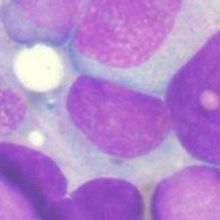 WIKIPEDIA, VASHIDONSK
WIKIPEDIA, VASHIDONSK
A new therapy designed to treat cancer by regulating gene expression has helped a handful of patients with blood malignancies in a preliminary clinical trial, according to pharmaceutical company OncoEthix. Today (April 7) at the American Association for Cancer Research (AACR) annual meeting in San Diego, California, the Lausanne, Switzerland-based firm presented unpublished data from a Phase I clinical trial of the drug, “OTX015,” a small-molecule inhibitor of the BET-bromodomain proteins BRD2, BRD3, and BRD4, which help to regulate gene expression. Seven of 38 patients for whom sufficient OTX015 trial data were available seemed to have benefited from the drug, OncoEthix announced. Four of those seven patients have acute myelogenous leukemia (AML), while others enrolled in the trial have other hematological malignancies, including diffuse large B-cell lymphoma and multiple myeloma. One of the four AML patients experienced a complete response—meaning that his or her bone marrow and...
“To my knowledge, this is the first reported successful Phase I clinical trial with BET inhibitors targeting AML,” said Lin-Feng Chen, an associate professor of biochemistry at the University of Illinois, who was not involved in the work. “Although it is not completed yet, the results so far are very encouraging.”
“Everybody’s excited about bromodomain inhibition,” OncoEthix Chief Scientific Officer Esteban Cvitkovic said during an AACR press conference.
Pharma giant GlaxoSmithKline (GSK) and the Cambridge, Massacusetts-based firm Constellation Pharmaceuticals are among other drug companies with BET-bromodomain inhibitors in their pipelines. GSK’s I-BET762 is currently in a Phase I clinical trial.
Cvitkovic said that OTX015 has not yet shown cumulative toxicity. The firm is still working to determine the optimal dosing and schedule for the drug, administered as a monotherapy, he added.
“This trial . . . provides a great example for targeting epigenetic regulators for cancer therapy,” Chen wrote in an e-mail to The Scientist, adding that “the promising results from this trial will allow more clinical trials in the near future with BET inhibitors targeting other types of leukemia or cancers.”
Chen added that the study also paves the way for other investigational epigenetic cancer therapies. Targeting epigenetic machinery “provides a promising approach for treating drug resistance and clinical relapse and offers new option for combination therapy,” he said. “The major challenge is how to predict the treatment outcome. There is no clear biomarker to determine which patient would respond and benefit most from the therapy.”
Interested in reading more?




